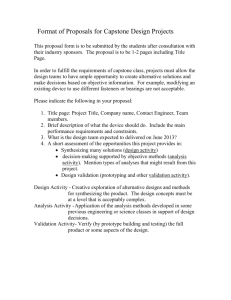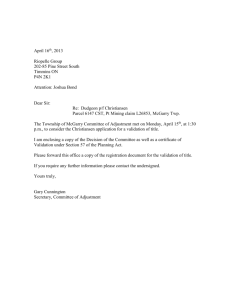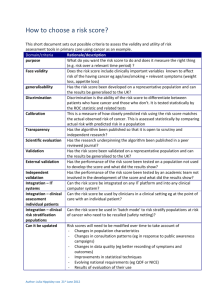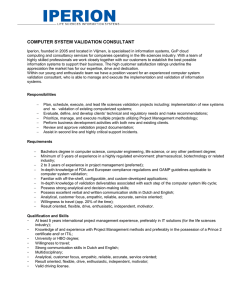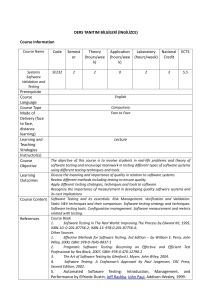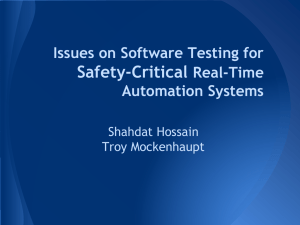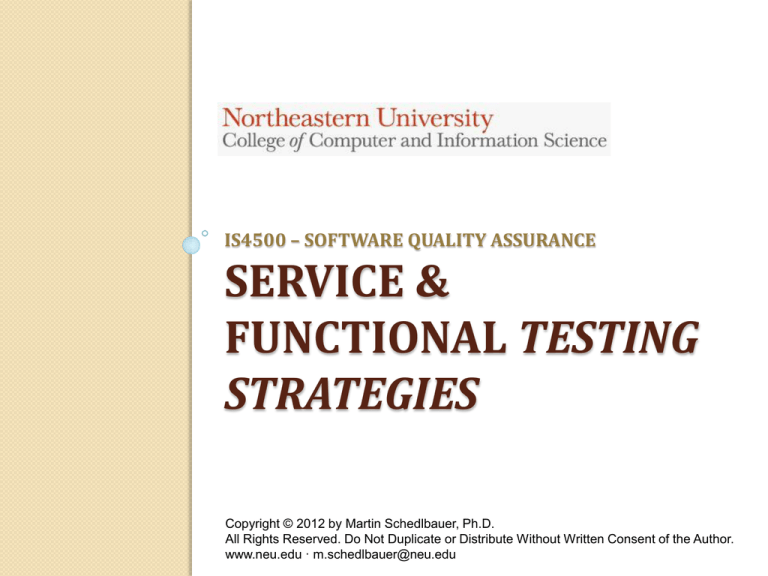
IS4500 – SOFTWARE QUALITY ASSURANCE
SERVICE &
FUNCTIONAL TESTING
STRATEGIES
Copyright © 2012 by Martin Schedlbauer, Ph.D.
All Rights Reserved. Do Not Duplicate or Distribute Without Written Consent of the Author.
www.neu.edu · m.schedlbauer@neu.edu
Objectives
Upon completion of this chapter you will be able
to:
◦ Test the services or functions provided by a solution
◦ Reduce the number of test cases through equivalence
partitioning
◦ Identify common problems through boundary analysis
◦ Map application states and state transitions
◦ Leverage use cases to build better test cases
◦ Use decision tables to understand expected responses
◦ Perform ad-hoc exploratory testing when specifications
are unavailable
2
Solution Validation & Testing
v1.01
Motivation
Testing is not an ad hoc activity and does not
simply mean that one “bangs against” a
solution in order to break it.
Rather, testing is a formal activity that is
documented in detail.
In fact, one of the most important skills of a
successful tester is to be detail oriented and
methodical.
Of course, the degree of formality depends on
the type of solution that is being tested and
the consequence of latent defects.
3
Solution Validation & Testing
v1.01
Black Box Testing
This module shows how to test software
with “blinders on”, i.e., the solution is
treated as a “black box” or in some cases
as a “grey box”.
While programming skills are not
necessary to be an effective tester, some
understanding of programming is helpful,
particularly when it comes to
understanding boundary value analysis.
4
Solution Validation & Testing
v1.01
Exploratory vs Predictive Testing
Exploratory testing is an ad hoc approach
where testers proceed without a test plan.
This approach is used when there is an
absence of a formal specification or defined
requirements.
It is also used during reverse engineering to
learn about the solution’s functionality and
capabilities.
The opposite of exploratory testing is
predictive testing, where testing is done based
on specific test cases derived from the
requirements specification.
5
Solution Validation & Testing
v1.01
What is a Test Case?
A test case defines the expected outcome
for a specific set of stimuli.
All test cases combined make up a test
suite.
In practice, the terms test case and test
scenario are used interchangeably.
Writing test cases presumes that there is a
requirements specification, otherwise
perform exploratory testing.
6
Solution Validation & Testing
v1.01
Test-to-Pass vs. Test-to-Fail
Test-to-Pass: the tester checks that the
solution meets the stated requirements
and that it does not break when used in
accordance with the specification.
Test-to-Fail: the solution is pushed to the
edge and is made to break – testers are
forcing errors and are using the solution in
ways that were not laid out in the
specification.
7
Solution Validation & Testing
v1.01
Practical Approach
Of course, testers should start with the
test-to-pass approach first to make sure
that the solution meets the specification
and that there are no defects when used
properly.
Then testers should “exercise” the solution
and see how it behaves when used outside
the design boundaries.
8
Solution Validation & Testing
v1.01
Discussion Question
9
Solution Validation & Testing
What would test-to-pass and
test-to-fail mean for a
computer that you are
trying to purchase?
v1.01
The Test Case
10
Test cases should be properly documented and
tracked, ideally in a database such as those
provided by testing tools.
Documented test cases are critical for logging
purposes and to know what exactly has been
tested.
They are essential for regression testing.
Every time some aspect of the solution has
changed, all test cases testing potentially affected
areas must be re-run.
The test case should define the precise inputs and
expected outputs; it is a series of stimulus/response
pairs.
Solution Validation & Testing
v1.01
Components of a Test Case
11
Solution Validation & Testing
v1.01
Use Case Analysis in Testing
Use cases describe more specific usage
scenarios, whereas test cases simply apply a
set of inputs to a test object to observe its
reaction.
As such, use cases are more realistic since
they test an actual use of the system.
12
Solution Validation & Testing
v1.01
Actors & Use Cases
A use case is an interaction that a
prospective user has with a solution,
such as a software application or web
site.
The prospective user is referred to as the
actor.
Most actors are human users, but they can
also be external systems.
The key is that an actor is external, i.e., it
represents an outside stimulus.
13
Solution Validation & Testing
v1.01
Examples of Use Cases
Each use case represents a goal that the
actor intends to achieve by using the
solution.
Two examples of use cases for
BoatVentures:
◦ The broker intends to capture a new charter
lead
◦ The charter guest intends to search for
available yachts
14
Solution Validation & Testing
v1.01
Use Case Diagram
During initial analysis and when talking with
stakeholders, many analysts like to sketch
the actors and the use cases.
Use Case
Actor
15
Solution Validation & Testing
v1.01
Use Case Narrative
The details of each use case are documented
in a narrative that:
◦ lists the steps in each successful and unsuccessful
scenario that make up the interaction
◦ defines context
pre-conditions: set of conditions that must be true in
order for the use case to be successful
post-conditions: set of conditions that will be true once
the use case has completed either successfully or
unsuccessfully
◦ links to detailed requirements and business rules
◦ links to process models, data models, user interface
models, and other artifacts that support the use
case
16
Solution Validation & Testing
v1.01
Use Case Template
Most organizations use a standard template
for the use case narrative.
Although tools exist for organizing use
cases, most organizations prefer to use
Microsoft Word.
When using Word there are two general
approaches for writing the documents:
◦ one document per use case or
◦ one document that contains all use cases
17
Solution Validation & Testing
v1.01
Scenarios and Use Cases
Normal scenario
Alternate scenario
Exception scenario
18
Solution Validation & Testing
v1.01
Identifying Scenarios
The analyst starts by eliciting the normal scenario.
Then each step in the basic path is evaluated in
collaboration with the subject matter experts and
users.
At each step, ask:
◦ Are there other ways in which this step can be
completed?
◦ What could happen here?
◦ How might this be done differently?
◦ Does it always happen like that?
◦ What should we do if it happens differently?
◦ Is the outcome always the same? When is it different?
◦ Can we assume that the inputs are always as expected?
19
Solution Validation & Testing
v1.01
Workshop Activity
Goal:Work with use cases.
Time: 10-15 minutes
Format: Individually or in groups
Materials: Case study background information in workbook
Instructions:
• Go back to the case study background information and re-read the use case
narrative for “Book a Charter”.
• What are the scenarios that need to be tested?
• Are there missing scenarios that should be considered?
20
Solution Validation & Testing
v1.01
Creating Test Cases
When testing solutions, there are often
thousand or more possible scenarios to
test.
Reduce the number of test cases and focus
on the most important ones by using:
◦
◦
◦
◦
◦
21
Use Case Scenario Analysis
Equivalence Class Partitioning
Boundary Value Analysis
Decision Tables, and
State Charting
Solution Validation & Testing
v1.01
Test Cases from Use Cases
Each scenario of each use case becomes
the basis for a test case.
Since use cases are devoid of
implementation details, they have to be
expanded before they can become fully
specified test cases.
22
Solution Validation & Testing
v1.01
Equivalence Class Partitioning
Definition
An equivalence class or partition is a set of test cases
that exercise the same part of the solution and therefore
reveal the same defect if there is one present.
Equivalence partitioning is a methodical approach
to reducing the number (often infinite) of
possible test cases into a smaller, more
manageable, but still effective set of test cases.
Equivalence partition should be defined for
correct as well as incorrect input values.
23
Solution Validation & Testing
v1.01
Example of Equivalence Partition
Let’s take an example from the BoatVentures
case.
◦ When booking a charter, guests have to provide
the number of days for which they would like
to charter a yacht.
In this situation any value greater than zero
is valid, while any value of zero or less is
invalid.
Testing all possible scenarios is impossible
as there are an infinite number.
So, what is the practical set of test cases?
24
Solution Validation & Testing
v1.01
Boundary Value Analysis
Not all values are equally likely to fail, as
programmers tend to make more mistakes
at the “boundaries” of equivalence
partitions.
This has to do with the fact that
programmers frequently program control
logic statements, such as IF or SWITCH,
incorrectly.
25
Solution Validation & Testing
v1.01
Example of Boundary Conditions
For example, if BoatVentures states that
yacht charters over 7 days receive a 10%
discount, then we would expect that there
is a control flow statement in the code that
tests for that condition.
if (Booking.Days > 7)
Booking.Price *= 0.1;
26
Solution Validation & Testing
v1.01
Identifying Boundary Edges
When defining equivalence classes, rather
than taking random values, it is most
revealing to choose values at the boundary
edges where programmers are most likely
to make mistakes.
When a boundary condition has been
identified, create an equivalence class for a
value just inside the boundary, the last valid
data point, and an invalid data point just
outside the boundary.
27
Solution Validation & Testing
v1.01
Other Equivalence Classes
Default and empty values
Bad data
28
Solution Validation & Testing
v1.01
Workshop Activity
Goal:Apply boundary value analysis to create good equivalence partitions.
Time: 20-30 minutes
Materials:
Format: Individually or in groups
• Whiteboard, flipchart, or paper
• Edge and bad data rules from workbook
Instructions:
Using boundary value analysis and the edge identification rules listed in the
workbook, create equivalence classes for valid and invalid inputs for the following
requirements and/or business rules:
• The number of charter guests on a time charter is limited to a maximum of
six
• “Daily Specials” charters must be booked within 48 hours of departure and
must be for a minimum of 2 hours but no more than 8 hours
• Day charters over 4 hours are discounted by 10% if paid with cash
What bad data or invalid inputs would you test in addition to the ones
discovered above through boundary value analysis?
29
Solution Validation & Testing
v1.01
Decision Tables
Decision tables provide a methodical way
to describe complex business rules where
an outcome is based on multiple conditions
and simple boundary analysis won’t suffice.
A decision table is a tabular representation
containing an exhaustive list of all
conditions that affect some action,
outcome, or calculation.
30
Solution Validation & Testing
v1.01
Example of a Decision Table
Rules for a BoatVentures charter:
◦ If the charter is longer than 4 hours, then a 10%
discount is applied
◦ Parties of fewer than 3 guests do not require a
mate and are discounted 5%
◦ All off-season charters receive a 10% discount
◦ All discounts are cumulative and multiple discounts
can apply
31
Let’s turn this into a decision table…
Solution Validation & Testing
v1.01
Workshop Activity
Goal: Identify test cases through decision table analysis.
Time: 20-25 minutes
Materials:
Format: Individually or in groups
• Whiteboard, flipchart, or paper
Instructions:
Build a decision table that represents the following rules regarding licensing of
charter operators:
• Operators of time charters must have an OUPV 50GT license for all vessels
less than 48’; for those 48’ or over they must have a 100GT endorsement
• Operators of demise charters must possess at least a 50GT Masters license if
they are not employed or contracted through BoatVentures
• Operators of demise charters employed or contracted through BoatVentures do
not require any licenses
32
Solution Validation & Testing
v1.01
Solution
1
2
3
4
5
6
7
8
Charter Type
D
D
D
D
T
T
T
T
Vessel < 48’?
Y
Y
N
N
Y
Y
N
N
Employed by BV?
Y
N
Y
N
Y
N
Y
N
X
X
X
X
50GT License?
X
100GT License?
Master License?
33
Solution Validation & Testing
X
X
X
v1.01
State Charting
The testing to this point has concentrated
on test cases based on various inputs –
both valid and invalid.
However, the logic and control flow in the
solution has not yet been validated.
State charting helps in testing the different
solution states and whether the solution
progresses through the states in the
expected sequence.
34
Solution Validation & Testing
v1.01
UML State Chart Diagram
35
Solution Validation & Testing
v1.01
Application of State Charts
Navigation Charts
◦ Each screen or page can be viewed as a valid
state and getting from one screen or page to
another would be a transition
Application Mode Charts
◦ Mode maps are applied when an application
enters some processing phase where different
actions are valid depending on the mode of the
interaction
36
Solution Validation & Testing
v1.01
Example: Navigation Map
37
Solution Validation & Testing
v1.01
Example: Mode Map
38
Solution Validation & Testing
v1.01
Workshop Activity
Goal: Create a navigation map using state charts.
Time: 20-25 minutes
Materials:
Format: Individually or in groups
• Whiteboard, flipchart, or paper
• BoatVentures CRM or other site
• Optionally a UML modeling tool
Instructions:
Build a navigation map for the BoatVentures CRM or another web site or
application of your choice.
You should use LucidChart.com or a similar UML modeling tool if possible.
39
Solution Validation & Testing
v1.01
Recording Defects
Defects discovered during testing must be
recorded and details of the test and the
unexpected result must be communicated
to the solution development team.
The report must include sufficient
information for the solution team to
understand the defect and be able to
replicate it.
40
Solution Validation & Testing
v1.01
Defect Attributes
41
Let’s inspect the list of attributes that
should be recorded for a defect…
Solution Validation & Testing
v1.01
Summary
In this module we learned that:
◦ Testing is a methodical activity that requires careful analysis
◦ Test cases are either test-to-pass or test-to-fail
◦ Use cases help in defining test cases; there is one test case
for each use case scenario
◦ Equivalence partitioning reduces the number of test cases
◦ Boundary value analysis helps define the right equivalence
classes
◦ Decision tables exhaustively list all combination of factors
that affect an outcome when testing complex business rules
◦ State chart help analyze and track the mode of an
application
◦ Defects are carefully recorded following a template that
contains the information needed to reproduce and resolve
the error
42
Solution Validation & Testing
v1.01

